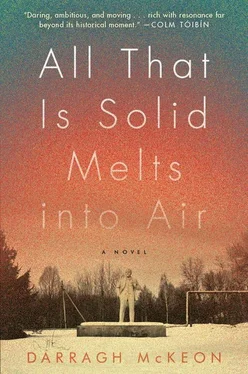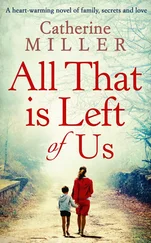“That may be true, but not much. We’re not lucky.”
“No. You’re right. We’re not.”
GRIGORY SITS OUTSIDE, leaning on a metal table, dabbing his fingers in a pool of condensation at its lip. A spider dangles below, twirling languorously. He will soon begin surgical prep, inside for the rest of the day, so he takes in cool breaths while he can; watching water twist along the tendrils of ice that hang from the roof of the clinic, the one solid building in the whole settlement. Brick walls half a metre thick that mercifully retain heat. They speculated as to its use before they came here, an old barracks perhaps. A stubborn musty scent in the operating theatre despite the plastering, the painting, and the daily scrubbing.
People here are waiting, solemnly waiting. He watches them walk laps around the recreational area in the middle of the settlement. Walking and waiting.
An elderly man sits on a nearby bench, hands clamped under his armpits. Grigory feels no impulse to speak to him, nor to his own colleagues when he twists open the handle of the common room, puts his shoulder to the expanded door. Even in his break times he is unaccompanied, slow to welcome any intrusion into his guarded world. Four tables in the room and still he manages to stake out a private territory. He tells himself, has hinted to others, that his mind needs to recuperate, so many hours spent in total concentration—and this is true; sometimes it’s beyond him to make the few simple choices demanded of him in their small canteen. When they ask—tea or coffee? rice or potatoes?—he shifts listlessly, unable to mouth the correct words.
He can also recognize, when he has a will to, that these are the strategies of an only child: to create a world impervious to others, your passions sealed off, as contained as the canisters of oxygen the anaesthetist carts into the building. This is his ease.
How different would it be, he wonders as he pushes wearily off the chair, with Vasily here?
Out in the fields the snow is so deep that Artyom has to wade through it. He keeps his pelvis lower to the ground and leans into his steps. It takes so much effort that he doesn’t feel the cold. He reaches the first trees of the forest and trudges inside. These trees mark a border; time slows as you pass through the line of branchless trunks. The light that comes down has air inside, as if it’s been passed through a tea strainer, and the rays split into strands of drops as they fall onto the forest floor, landing silently like dancers, turning as they descend.
The sound of his own breath. Trickles from hidden streams. A branch struggling under its load. The air, too, somehow distilled. Smoky air. Strong air.
Tall trunks with no branches. A stoat slithers up one, twenty metres away, a white blur ascending.
Artyom walks and sits and walks again, looking for fallen branches. When he is thirsty he scoops snow into his mouth and looks up at the canopy far above him.
It was a forest, back there, that claimed his father, and in the silence Artyom can feel a connection amongst these tall trees, as if they are drawing him here. They sway nervously, confessing their remorse, creaking like a door forced open in the wind.
BACK IN MINSK, they had been in the emergency shelter for a month before they found his father. New people kept arriving. At the end of the first week, their floor space was cut in half, so they no longer had room to lie down flat. They were forced to sleep in shifts, there were so many of them bunched in under that roof. The whole place stank of sweat. People complained continuously of the smell. Babies were getting rashes from not being cleaned. Eventually, the militia set up a line of hoses at the back of the warehouse to deal with the problem. Everyone was given a plastic bag, and you queued up at the back door, and once you stepped outside you had to strip naked and put your clothes into the bag. You had to tie a knot in the bag and then, still holding your clothes, you’d stand in front of the wall, near a drain, and the militia would hose you down. Afterwards, you used your own clothes to dry yourself off, then put them back on and reentered the warehouse, with small puddles between your toes, your shirt and underwear sticking to you. For the first few days the militia guys would rate the women. The women would stand in a line, naked, holding their plastic bags in front of their genitals, and the guards would shout out a score between one and ten. If any woman complained, her bag would be sprayed until it was torn and her clothes soaked through, so she would have to walk back inside naked or sodden, the material sticking to her skin, under the watchful eyes of a thousand people.
Sofya would always come back crying. His mother always came back quiet and stayed quiet for most of the day.
There was a place to wash babies. Gas rings were laid out on the ground with metal buckets of water resting on top of them. Another bucket of cold water would be placed on the ground beside each one, so the mothers could balance the temperature of the water and then scoop and pour it over the babies. Artyom saw one mother accidentally touch her child’s foot on the metal rim of a hot bucket, burning it. The infant wailed, bellowing with such desperation that a crowd of people came outside to see what was wrong.
There was no information about his father. Not the first week. Not the first month.
People talked in the beginning about how they got here, what they were doing before the call to evacuation. They went through their whole routines: who said what, who did what. People speculated. Many thought it was the capitalists that had sabotaged the plant, infiltrated it somehow over a long period of time and caused this chaos. The capitalists were intimidated by the progress of Soviet energy, they were becoming desperate in their scheming. People didn’t stray into wider subjects, though, they didn’t talk about where they came from, what paths their lives had taken and—as Artyom came to notice—after the first week, they almost stopped talking altogether.
Nobody knew anything about what had happened to their loved ones. A great blanket of longing descended upon the building. There were guards stationed along the perimeter fence; no one could pass without bribing one of them. Some gave away all they had in the first few days and walked to the hospitals or the other shelters, but they couldn’t find any information there either and were forced to return for the food and shelter offered to them, poorer than before, no chance of release until they were told they could go—if they would ever be told they could go.
Arguments broke out over floor space. Every centimetre was a precious commodity. Some people would try to adjust the makeshift walls of their allocation, and those who had been cheated would return and scream and tussle, and Artyom saw how petty people could become when desperate.
They had been there almost a month when Artyom’s mother woke him in the middle of the night.
“Artyom,” she whispered.
He woke easily. He couldn’t sleep soundly in this place, his body so confined, the constant shuffling noise, snores, sleepy mumbles, infants taking it in turns to wail their complaints.
“Yes?”
“There’s something I need you to do.”
She pulled out a small package from the folds of her clothes, a piece of soft cloth, wrapped very tightly with some elastic cord. She unwound the cord and displayed three gold nuggets. Artyom couldn’t see them very well in such weak light, so it was only when he touched them that he realized they were teeth.
He pulled his hand back, startled.
“Where did you get them?”
“It’s not important.”
“It is important. Where did you get them?”
“I didn’t steal them.”
Читать дальше












